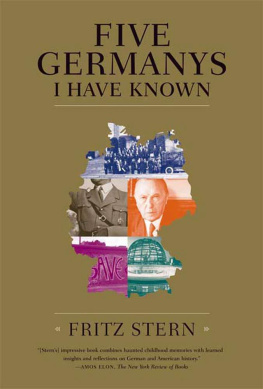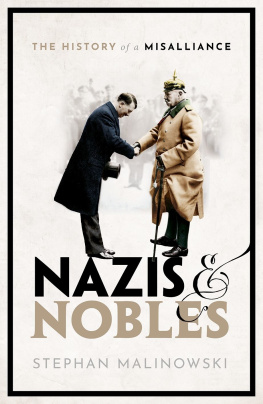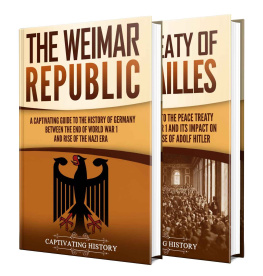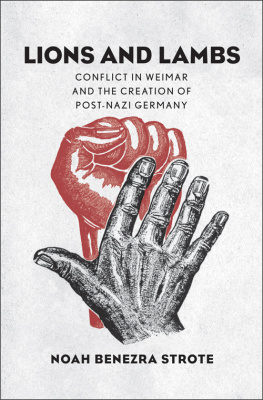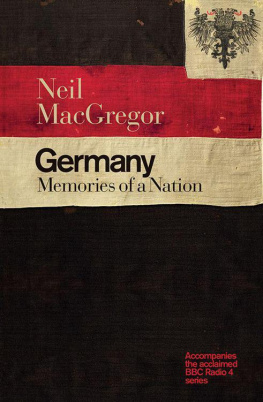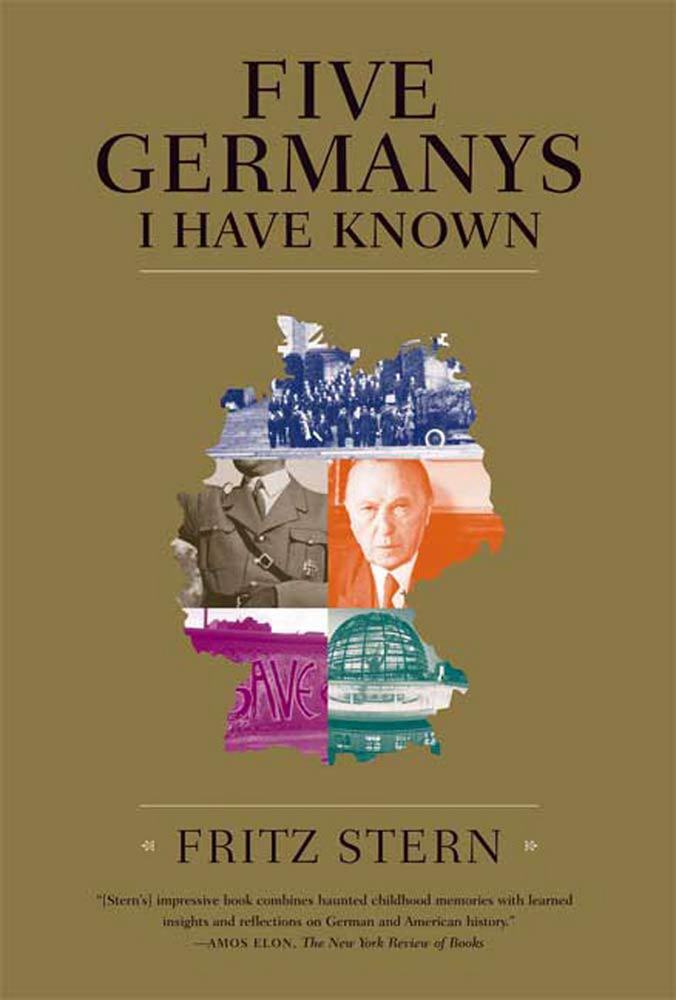
THIS BOOK HAS A HISTORY and it began in Europe. In 1998 I was spending several months at the Netherlands Institute for Advanced Study, where the rector, my fellow historian Henk Wesseling, decided I should give the lecture at the year-end ceremonyon any topic. He brushed aside my pleas regarding my other commitments with the counsel: Make it personal. So I spoke about Five Germanys I Have Known, and NIAS published the talk. A closed chapter, I thought.
Back in the United States, I showed the text to a few friends, including Roger W. Straus, president of Farrar, Straus and Giroux. Roger saw the lecture as the seed of a book and proposed that he publish it. I signed up for what I thought would be a short-term task, but a book develops its own long-term demands. I owe the book to Roger, and I regret that he didnt see its completion.
I had the good luck to have Rebecca Saletan as my first editor, wise and admonishing, until the day she left for new responsibilities at another house. Eric Chinski nobly assumed a heavy, undigested legacy, and with literary shrewdness and great pedagogic humor gave the project new life. The readerand Iowe his sense of parsimony a great debt: existing pages, like the deleted ones, bear the imprint of his semi-indulgent judgment.
Friends were indispensable. Lionel Gossman, a literary universalist, read early chapters, noting stylistic infelicities and spotting the big and still only partly developed themes. He understood my intent, a boost to my morale. When the text was almost complete, I asked three friends and colleagues for acritical reading: Ralf Dahrendorf, with his incisive comments, revived a collaborative tradition between us, going back nearly a half century; the comments of James Sheehan and Jrgen Kocka were deeply helpful extensions of countless conversations we have had. Roger Errera in Paris also gave me additional advice and encouragement. My debts to these and many other friends, accumulated over decades, are large. I hope the book in general is a testimony to the friendships that have formed my life.
I have had indispensable help in the intellectual work of ordering family papers and related chores: Carleen Roeper helped immeasurably at the beginning, Jocelyn Wilk patiently ordered disordered papers, and Jonathan Shainin with good humor and expertise prepared the final manuscript.
The book is dedicated to my children: their love and support have been an inestimable gift. By being firmly anchored in the United States, they sustained my forays into familiar, foreign lands.
Elisabeth Sifton, my wife, has been a life-enhancing presence for me throughout: her spirit, blithe and critical, has inspired my work. She understood my new ties to my old country and shared in them. She was at my side with profound and prescient help, and her occasional candid exasperation served as a much-needed spur. My gratitude to her is joyfully unbounded.
The preparation of this paperback edition has allowed me to correct a few mistakes in the original edition. I am grateful to friends and readers who have alerted me to these details. In preparing this edition, as in all previous efforts, Gena Hamshaw, assistant editor, has been an expeditious help to text and spirits.
Einsteins German World
Dreams and Delusions
The Drama of German History
Gold and Iron
Bismarck, Bleichrder, and the Building of the German Empire
The Failure of Illiberalism
Essays on the Political Culture of Modern Germany
The Politics of Cultural Despair
A Study in the Rise of the Germanic Ideology
The Responsibility of Power
Historical Essays in Honor of Hajo Holborn ( coeditor )
The Varieties of History
From Voltaire to the Present ( editor )
THE YEAR 2002 WAS EPILOGUE: sad and ultimately healing, a kind of closing of a lifes circle. Just before New Years Day, Marion Dnhoff telephoned me from Crottorf, where she was spending Christmas with her nephew Hermann. For several years she had been in failing health, with recurring bouts of cancerafflictions she bore stoically. I had visited her in Hamburg earlier in the winter, and when I had seen her one evening, champagne had dulled the pain of her now-paralyzed arm, but the next morning brought renewed excruciating agony. Now she wanted to know when I would be returning to Europe: in March, I said, to Warsaw, our city, for a book presentation plus a symposium with Geremek and Michnik. I think Ill be better, she said, and Ill come, too.
Over the next weeks I called her regularly, as I had before; in February, she had a fall in her home and was taken, comatose and unconscious, to the hospital. A fortnight later, she awoke and, cognizant of her now gravely weakened condition, demanded to be taken to Crottorf. When I learned this I planned to see her there when I got to Europe. After my meeting in Warsaw, I went to Sils, and the very next day Hermann called. Marion had died early that morning: realizing that the end was near, she had told the night nurse, Call Hermann, and then died peacefully.
So now I went to Crottorf for her burial. When I got there, Hermann wanted me to say good-bye to her and took me to the castles private chapel, where her simple wooden coffin lay on a wooden block, a few flowers on top. At the service in the great hall, a pastor friend of Marions gave a brief sermon,family and friends sat in three or four rows, dressed in black: Dnhoffs and Hatzfeldts of four generations, Weizscker, Ted Sommer, Dahrendorf, Kissinger, and Christa Armstrong, her old friend from East Prussia. We walked behind the hearse to the village cemetery where, in the Dnhoff corner, one of her brothers had also been buried. Clouds suddenly parted, and a brilliant spring sun lit the scene: the open grave beneath a linden tree, birds singing, and each of usincluding her crusty housekeeper with Marions mischievous dachshundapproaching it, bowing, and dropping a sprig and a handful of soil on the coffin. We took leave of her in the austere tradition into which she had been born: one of quiet human decorum and nature unspoilt. Then we returned to the castle for a simple meal, with children underfoot and many private conversations. It was calm but exalted, perhaps the last time that her friends and family would be together.
A few days later, in Hamburg, of which Marion had been an honorary citizen, there was a state funeral for her in the citys largest Protestant church. Hermann had asked me to be one of the four eulogists, speaking for Marions friends; city officials picked me up early, and for a while I sat alone in the reserved pew at the front, alternately uneasy in the present and sunk in the past. The others gradually came to the pew: Helmut and Loki Schmidt, Chancellor Schrder and President Rau (though only the latter spoke, protocol forbidding both chancellor and president to speak at the same public occasion). Weizscker spoke, then Schmidt, representing Die Zeit , and I followed him, saying once again what I had written before: If there was one place in Germany that again was home for me, it was in her house and company, in everything she said and didnt say. When I returned to my seat, Helmut and Loki Schmidt clasped my hand in unspoken comfort. Yet Marion felt then, and remains, a steady presence in my life: Elisabeth once casually called her your spiritual mother, a new thought but apt. In ways I cant express, she, as no other person, reached to the child in me and treated the adult as friend and intellectual companion.

